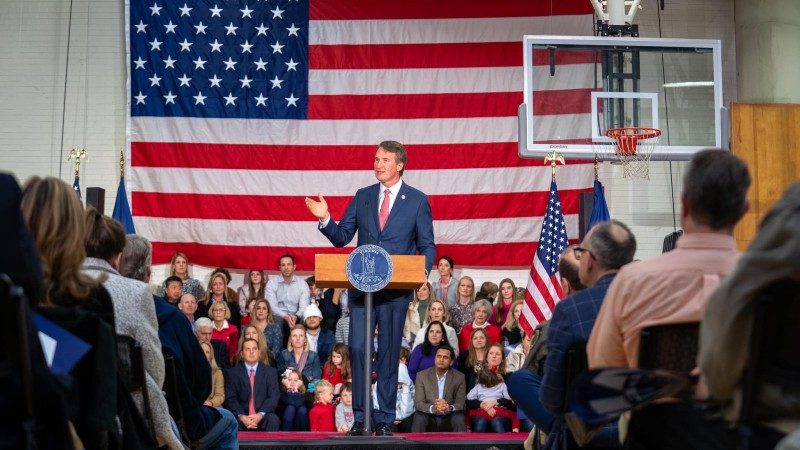Governor Glenn Youngkin (R) and the legislators of both parties who have given him at least some of the tax reforms he asked for need to stop being shy and take a real victory lap. He has been in office less than two years and has diverted $5 billion from tax coffers back to Virginia’s citizens so far, with more to come in 2024 and beyond.
Most of that was approved by the 2022 General Assembly and is now in effect for a second full tax year, but the 2023 General Assembly just sweetened the pot. The long-delayed budget compromise approved September 6th added more than $1 billion in single-shot refunds and long-term tax cuts.
- Two years ago, the standard deduction claimed by most Virginians paying income tax was $9,000 for a married couple, and that is now $16,000 and for Tax Year 2024 will go to $17,000. That saves that couple up to $1,265 over the three years. It lowers total tax income taxes more than $1 billion per year.
- People paying income tax (and remember many business operators pay on the individual tax returns) will now receive a second tax rebate. The rebate was up to $500 per couple for 2022 and will be another $400 for 2023, adding up to $900. They returned almost $2 billion.Looked at another way, that is equivalent to shielding more than $15,000 more of that couple’s joint income from tax. For many low-income Virginians, their income tax liability was wiped out entirely.
- The sales tax on unprepared food purchases was 2.5% two years ago and is now 1%. Basically, the state share of the tax is gone but the local tax remains. That was estimated to save Virginians $115 million in the fiscal year that ended June 30. Rising grocery prices make that tax break better every year.
- Two years ago, Virginia provided no special tax treatment for military retirement pay. The 2022 General Assembly created a subtraction for that income, phasing in over a few steps, for retirees above a certain age. The 2023 compromise has now extended that tax break to younger retirees, who will eventually be able to shield another $40,000 of their income from tax. That was worth almost $145 million per year with the age floor, and without the age floor it is almost a $200 million annual tax break.
- Two years ago, Virginia recognized the Earned Income Tax Credit, a federal provision that provides a major tax break for lower income people with jobs. Now Virginia’s EITC not only lowers their taxes, but for some it provides a refund, in effect a grant to supplement their income. The value of that to those families was pegged at $159 million in the fiscal year that ended June 30. It was not changed by the recent Assembly actions.
Those are five significant changes that reached virtually every Virginia household. Governor Youngkin had proposed far more tax relief, of course, and was left with only part of his plan. Far more was financially possible, and the state finds itself with unprecedented cash balances despite giving up these revenues. These were the tax breaks for which he could garner bipartisan, bicameral support.
That bipartisan support started with Youngkin’s predecessor. Following Youngkin’s victory where he promised tax reforms, outgoing Governor Ralph Northam (D) prepared a draft budget that incorporated some of them, including the sales tax break on food and the refundable EITC. Having those baked into the introduced budget helped.
But the bipartisanship only went so far. The early roll calls on the approved provisions were hardly unanimous, the Virginia Senate during both years showed the greatest resistance to lowering revenues. Those who are seeking new terms may claim it was only a negotiating position and they were planning to agree eventually. The voters should think about that, at least.
The Democrats have attacked Youngkin’s failed plans to lower the top individual tax rate from 5.75 to 5.5%, and to lower the corporate income tax from 6 to 5%. The quarter point drop in the individual rate probably faltered because it was so small few taxpayers would get excited about it, and the business community greeted the corporate tax proposal with total silence and indifference. Their loss.
Between now and the election, just after they claim credit for various tax reforms they initially opposed, many candidates will now say something like “we put people over rich corporations.” The line was trotted out during the recent special session. Corporations are just groups of people, and business taxes always come out of the pockets of human beings of all income levels, but those facts are lost to the voters they target.
Whether Virginia can continue to lower taxes will depend first on the election outcome and second on the continued performance of the state’s economy. Both will be clear when Governor Youngkin makes his next major push to the legislature with the introduction of his first real budget bill in December. As Cato always concluded with the demand that Carthage must be destroyed, the Jefferson Institute will always return to the demand that the Virginia tax code must be indexed to inflation.

Steve Haner is Senior Fellow with the Thomas Jefferson Institute for Public Policy. He may be reached at Steve@thomasjeffersoninst.org.






